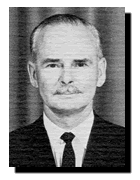
 |
Mr Len Harris became the fourth head of the Laboratories following the retirement of Mr McCay in 1960. He was promoted to the position of Supervising Engineer, Research, from that of Supervising Engineer, Long Line Equipment, in the Engineering Works Division. He was, however, well acquainted with the Laboratories, having served for a period of 24 years as a member of their staff from 1930, when he first qualified as an engineer. |
Mr Harris joined the Department as a Cadet Engineer in 1926, just after his eighteenth birthday. He completed his training in 1930, gaining the degree of Bachelor of Science from Melbourne University, and was appointed as an engineer in the Laboratories. Mr Harris remained with the Laboratories until 1954, gaining promotion to Divisional Engineer in 1948 and acting as Sectional Engineer, Line Communication, from 1947 to 1954. During this period, his work lay in the fields of telephone transmission standards. transmission equipment and systems, and the design and evaluation of telephone apparatus and broadcasting studio equipment. His name is closely associated with the early establishment of the A.P.O. telephone and telephone transmission reference standards, with the National Broadcasting System, and with carrier system investigations.
In 1954, he was promoted to Sectional Engineer, Long Line Equipment, leaving the Laboratories for a period of 6 years before returning as Supervising Engineer. During this period he became Supervising Engineer, Long Line Equipment, and was heavily involved in the Sydney-Melbourne coaxial cable project - the first broadband system to be used in Australia to link capital cities. He returned to the Research Laboratories as Supervising Engineer, Research, in 1960 and immediately became involved in a joint Post Office/Public Service Board committee review of the Scope, Functions and Organisation of the Research Laboratories. The report of the committee, known as the Harris-Brown-Dwyer Report, formed the basis for the re-organization of the Research Laboratories as a Branch in 1963, and Mr Harris was promoted Assistant Engineer-in-Chief in charge. This reorganisation gave the Research Laboratories enhanced status in the Department and the framework then laid down has been the basis of growth over the ensuing years.
In 1964, following a major reorganisation of Headquarters, Mr Harris was promoted to First Assistant Director-General in charge of the new Planning and Research Division, with overall responsibility for the Planning and Research activities of the Post Office. This promotion ended his period of direct responsibility for the Research Laboratories, although, in his position as First Assistant Director-General, he continued to guide the growth and programme of the Laboratories and worked for closer liaison between the Laboratories' activities and the mainstream of the Department's engineering requirements. Mr Harris recognised the opportunity that the growing research schools in the Australian universities offered for stimulating research on projects of interest to the Department and he has actively fostered relationships between the Research Laboratories and the Universities. He was Chairman of the Radio Research Board - a body that provided grants of over $100,000 per annum to support research projects in Australian universities. His interest in tertiary education was demonstrated by his membership of the Engineering Faculty
Mr Harris continued to occupy the position of First Assistant Director-General until his retirement in May 1973, but for the last year or so, he was assigned to special duties associated with the telecommunications planning aspects of national defence. During his career, Mr Harris was active in the international relationships of the Department and participated in and led Australian delegates to I.T.U. and associated conferences and to other international organisations. Outside the Department, Mr Harris showed an active interest in professional and scientific bodies such as the I.E. Aust., I.R.E. and ANZAAS. His services to Australian telecommunications were recognised in 1972 when he was awarded the rank of Officer of the Order of the British Empire.
Last updated: 6 July 2001